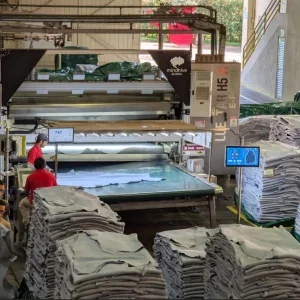Sports company Puma will make a commercial version of its experimental Re:Suede trainer, the Re:Suede 2.0, available for sale, after the company demonstrated it could turn the Re:Suede into compost under tailor-made industrial conditions during a two-year pilot project.
As part of the experiment successfully concluded in late 2023, Puma produced 500 pairs of its suede trainer with materials selected for their ability to decompose, such as Zeology-tanned suede (Zeology is a tanning agent that is free of chrome, heavy metals and aldehyde, and enables the creation of compostable, biodegradable and circular leather).

Volunteers wore the Re:Suede for six months before they returned them to Puma, so the trainers could be turned into compost at Puma’s composting partner in a specially equipped industrial composting set-up.
The German multinational will now make 500 pairs of the commercial version of this shoe, which has been developed to incorporate the lessons learned during the experiment and the feedback received from the volunteers.
“Re:Suede 2.0 is an important step towards finding viable end-of-life solutions for our footwear,” said Anne-Laure Descours, Puma’s chief sourcing officer. “While we are excited about this progress, we will continue to innovate with our partners to determine the infrastructure needed for a scalable long-term solution, essential for achieving meaningful impact in waste reduction.”
Once the Re:Suede 2.0 trainers are worn out, customers can return them for free. Puma will then send them to its partners so they can be put through a specially equipped industrial composting process. In exchange for sending them back, customers will receive a 20% discount on their next purchase.
The Re:Suede project was created as part of Puma’s Circular Lab, an innovation hub led by the firm’s innovation and design experts aimed at creating the future of its circularity programmes.






